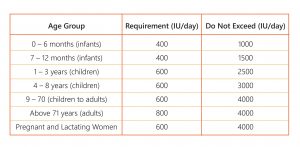Vitamin D, also known as the Sunshine Vitamin, despite its name is not a vitamin; rather it is a hormone that regulates and promotes the absorption of calcium in our body. Read on to find out what vitamin D can do for you.
THE UNIQUE NUTRIENT
Vitamin D exists in two forms, namely vitamin D3, which is also known as Cholecalciferol found in animal-based foods like fish, and vitamin D2 found in plant-based foods like mushrooms also known as Ergocalciferol. Vitamin D3 is also produced under our skin on exposure to sunlight and is said to be the more effective form of the two.
What is unique about this vitamin is that it is produced by our body. About 90 percent of the vitamin D required by us is produced by our body. Upon exposure to UVB rays of sunlight, provitamin D under the skin gets converted to previtamin D, which under the body heat conditions gets transformed to Vitamin D3 and upon transport through the liver and kidneys gets converted to Calcitrol.
Calcitrol is important to maintain and regulate calcium and phosphate balance in our body. Calcium and vitamin D work together to maintain healthy musculoskeletal, oral, nervous, cardiovascular, respiratory and immune systems.
The amount of sunlight required to produce vitamin D varies with age, skin color, sun exposure, and other medical conditions. The production of vitamin D from the skin decreases with age, and also the amount of Vitamin D required by our body varies with age.
Although much has been written, spoken and read about this unique and discerning vitamin, it’s deficiency and related ailments is still a global problem, particularly in older populations.

The Dangers Of Excessive Intake
Taking Vitamin D in excess over a prolonged duration can cause a condition known as hypercalcaemia, that could not just cause damage to the heart and kidneys, but also weaken the bones. Sound contradicting right? Yes, it’s true.
CAUSES OF VITAMIN D DEFICIENCY
Some of the most common causes of vitamin D deficiency are:
- Inadequate Dietary Intake (especially infants, children and young adults)
- Inadequate exposure to sun (especially infants, children and young adults)
- Kidney and/or Liver disease (older adults)
- Surgery of disease affecting absorption of fats (older adults).

SYMPTOMS OF VITAMIN D DEFICIENCY
The most serious complications of vitamin D deficiency are low blood calcium (hypocalcemia), low blood phosphate (hypophosphatemia), rickets (softening of the bones during childhood), and osteomalacia (softening of the bones in adults).
More often, vitamin D insufficiency is associated with reduced gastrointestinal calcium absorption, decreased bone density (osteopenia or osteoporosis), and, in some cases, a mild decrease of the blood calcium level, elevated parathyroid hormone (which accelerates bone resorption), an increased risk of falls and possibly resultant fractures, all of which can seriously affect one’s quality of life.
DIAGNOSING A DEFICIENCY
The diagnosis of vitamin D deficiency is carried out using a blood test called 25-hydroxyvitamin D Test. Although there are differences of opinion regarding the 25(OH)D levels that define vitamin D insufficiency and deficiency, most experts agree that levels lower than 30 are deficient, 30-50 as average and above 50 as good levels.
WHAT CAN BE DONE ABOUT A DEFICIENCY
The type, dose and duration of treatment will depend to a large extent on the above diagnostic levels, age and other medical conditions that would best be determined by your healthcare practitioner. As there are wide options of supplements available over the counter and with all the marketing aids available, it is important to seek medical advice to ensure you do not get deprived or overloaded with this vital and discerning vitamin.
HEALTH BENEFITS OF VITAMIN D
With considerable amount of research, vitamin D has also been linked to a load of health benefits, as enlisted below:
- Contribution to Bone Health
As is widely known, Vitamin D plays a role in calcium absorption and mineralization into the bones. - Management of Blood Sugar Levels and Prevention of Diabetes
Diabetes symptoms result from a lack of insulin or inadequate insulin secretion following increases in insulin resistance. According to some researches conducted calcium is necessary for insulin secretion, and vitamin D promotes calcium absorption and utilization, therefore contributing to the regulation of insulin secretion. - Protection Against Cancer
Vitamin D deficiency symptoms have been correlated with increased risks for cancer development. Research shows that vitamin D can affect the risk of breast, colon and ovarian cancers possibly due to its role in the cell life cycle or its ability to block excess estrogen.

- Combating Heart Disease
A growing number of research points to the fact that vitamin D deficiency is linked to increased risk for cardiovascular disease since it’s involved in regulating blood pressure, cholesterol levels and inflammation. - Enhancement of the Immune System: Our immune cells contain receptors for vitamin D, and it’s been shown that vitamin D seems to prevent prolonged or excessive inflammatory responses. Vitamin D helps with healthy cell replication and can play a role in protecting against the development of autoimmune conditions.
- Facilitation of Hormone Regulation and Mood Improvement
Because it acts like a hormone within our bodies and affects brain function, vitamin D deficiency has been linked to an increased risk for mood disorders, including depression, seasonal affective disorder, and severe mood problems experienced during PMS, insomnia and anxiety. Low levels of vitamin D can also interfere with proper testosterone and estrogen production, leading to imbalances that can result in many unwanted symptoms. - Support in Concentration, Learning and Memory
Several studies have shown that vitamin D also affects our ability to make decisions, concentrate and retain information. Some studies have shown that people with lower levels of vitamin D perform poorly on standardized exams, may have poor decision-making skills, and have difficulty with tasks that require focus and attention.
OUTLOOK ON VITAMIN D
Having understood the deficiency concerns and its health benefits, it is now our call to discern on maintaining our health using this vital and discerning Vitamin. It is of utmost importance to have a balanced diet with an active lifestyle to maintain overall good physical and mental health. The choice of D for “Deficient” or D for “Development” lies in our hands.
 Abraham Mathew Saji
Abraham Mathew Saji
REFERENCES:
- What you need to know about Vitamin D; Unlock Food.Ca; March 2019; https://www.unlockfood.ca/en/Articles/Vitamins-and-Minerals/What-you-need-to-know-about-Vitamin-D.aspx; accessed 24 May 2019.
- Boucher B.J.; Vitamin D insufficiency and diabetes risks; Curr. Drug Targets, 2011, Jan 12(1), 61-87; http://www.eurekaselect.com/72897/article; accessed 27 May 2019.
- Issa CM et. al; Vitamin D replacement and type-2 diabetes mellitus; Curr. Diabetes Rev, 2015 11(1), 7-16; https://www.ncbi.nlm.nih.gov/pubmed/25495839; accessed 27 May 2019.
- Vuolo L et. al.; Vitamin D and Cancer; Frontiers in Endocrinology; 2012, Vol. 3: 58; https://www.ncbi.nlm.nih.gov/pmc/articles/PMC3355893/pdf/fendo-03-00058.pdf; accessed 27 May 2019.
- Wang TJ; Vitamin D and Cardiovascular Disease; Ann. Rev. Med.; 2016, 67, 261-72; https://www.annualreviews.org/doi/pdf/10.1146/annurev-med-051214-025146; accessed 27 May 2019.
- Holick MF; Sunlight and vitamin D for bone health and prevention of autoimmune diseases, cancers and cardiovascular disease; Am. J. Clin. Nutr.; 2004, Dec., 80(6), 1678S-1688S; https://academic.oup.com/ajcn/article/80/6/1678S/4690512; accessed 27 May 2019.
- Anglin RE et. al.; Vitamin D deficiency and depression in adults: systematic review and meta-analysis; Br. J. Psych.; 2013, Feb, 202, 100-107; https://www.cambridge.org/core/services/aop-cambridge-core/content/view/F4E7DFBE5A7B99C9E6430AF472286860/S0007125000273418a.pdf/vitamin_d_deficiency_and_depression_in_adults_systematic_review_and_metaanalysis.pdf; accessed 27 May 2019.
- Wilkins CH et. al.; Vitamin D deficiency associated with low mood and worst cognitive performance in older adults; Am. J. ger. Psych; 2006 Dec, 14(12), 1032-40; https://www.sciencedirect.com/science/article/pii/S1064748112608902?via%3Dihub; accessed 27 May 2019.


